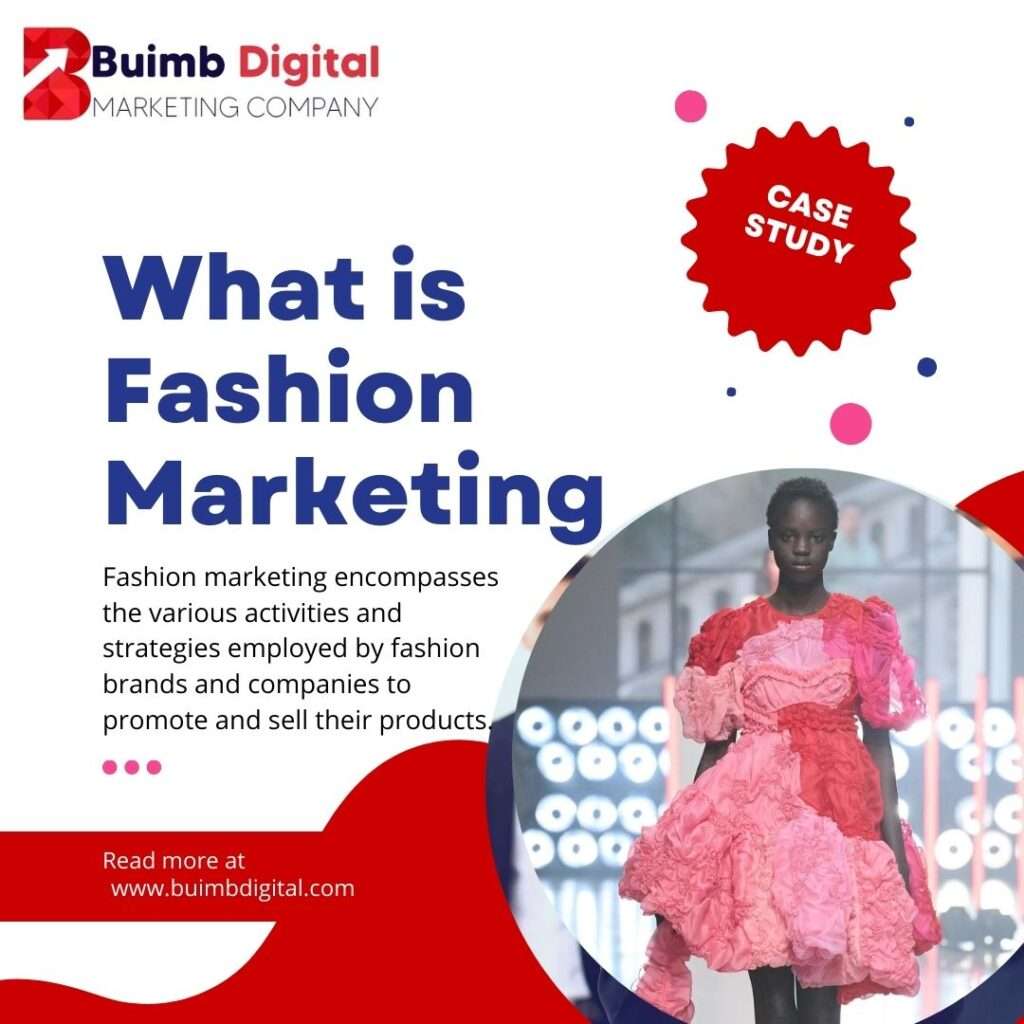What is Fashion Marketing
Fashion Marketing
Fashion marketing encompasses the various activities and strategies employed by fashion brands and companies to promote and sell their products. It involves understanding the target audience, creating compelling messages, and using the right channels to communicate with potential customers. Fashion marketing is about more than just selling clothes; it’s about creating a brand image, fostering customer loyalty, and staying ahead of trends.

Importance of Fashion Marketing in the Fashion Industry
In a highly competitive industry like fashion, effective marketing is crucial. Fashion marketing helps brands differentiate themselves in a crowded market, reach their target audience, and drive sales. It plays a pivotal role in shaping consumer perceptions, building brand equity, and ultimately contributing to a brand’s success or failure.
Historical Context
Evolution of Fashion Marketing
The concept of fashion marketing has evolved significantly over the decades. In the early days, fashion marketing was primarily about word-of-mouth and physical retail. As the fashion industry grew, so did the complexity and scope of marketing strategies. The advent of print media, such as magazines and newspapers, introduced a new platform for fashion advertising. The rise of television brought fashion shows and commercials into living rooms, further expanding the reach of fashion marketing.
Key Milestones in Fashion Marketing
- The Emergence of Fashion Magazines: Publications like Vogue and Harper’s Bazaar became influential in shaping fashion trends and consumer preferences.
- The Birth of Television Advertising: TV commercials and fashion shows broadcasted to a wide audience, creating new marketing opportunities.
- The Digital Revolution: The internet and social media platforms transformed fashion marketing, allowing for direct engagement with consumers and real-time marketing.
- The Rise of Influencers: Social media influencers have become key players in fashion marketing, often driving trends and consumer behavior.
Core Concepts of Fashion Marketing
Market Research
Market research is the foundation of any successful marketing strategy. In fashion marketing, it involves gathering and analyzing data about consumer preferences, market trends, and competitive landscape. This information helps fashion brands understand their target audience, identify opportunities, and make informed decisions about product development and marketing strategies.
Consumer Behavior
Understanding consumer behavior is crucial in fashion marketing. It involves studying how individuals make purchasing decisions, what influences their choices, and how they perceive brands and products. Factors such as cultural influences, personal preferences, and social trends all play a role in shaping consumer behavior in the fashion industry.
Brand Management
Brand management in fashion involves creating and maintaining a strong, positive image for a brand. This includes developing a unique brand identity, establishing brand values, and consistently communicating these to the target audience. A strong brand can differentiate a fashion company from its competitors and build long-term customer loyalty.
Product Development
Product development is a key aspect of fashion marketing. It involves designing and creating new fashion products that meet the needs and preferences of the target audience. Effective product development requires a deep understanding of market trends, consumer desires, and technological advancements.
Fashion Marketing Strategies
Advertising and Promotion
Advertising and promotion are central to fashion marketing. They involve creating compelling advertisements and promotional campaigns to attract and engage consumers. This can include print ads, TV commercials, online ads, and promotional events. The goal is to create buzz around the brand and its products, ultimately driving sales.
Social Media Marketing
Social media has become an indispensable tool in fashion marketing. Platforms like Instagram, Facebook, and TikTok allow fashion brands to connect with their audience, showcase their products, and engage with consumers in real time. Social media marketing involves creating engaging content, leveraging influencer partnerships, and running targeted ad campaigns.
Influencer Marketing
Influencer marketing leverages the reach and influence of social media personalities to promote fashion products. Influencers can create authentic content that resonates with their followers, driving brand awareness and sales. Collaborations with influencers can include sponsored posts, product placements, and exclusive partnerships.
Content Marketing
Content marketing involves creating valuable, relevant content to attract and engage a target audience. In fashion marketing, this can include blog posts, videos, lookbooks, and fashion guides. The goal is to provide useful information, showcase the brand’s expertise, and build a loyal following.
Event Marketing and Fashion Shows
Fashion shows and events are traditional yet powerful marketing tools in the fashion industry. They provide a platform to showcase new collections, generate media coverage, and create memorable experiences for attendees. Event marketing can also include pop-up shops, launch parties, and trunk shows.
Digital Transformation in Fashion Marketing
E-commerce
E-commerce has revolutionized the fashion industry, providing a global platform for brands to sell their products. Online shopping offers convenience, a wider product range, and personalized experiences. E-commerce marketing strategies include SEO, email marketing, and retargeting ads.
Digital Advertising
Digital advertising encompasses various online advertising methods, including display ads, search engine marketing, and social media ads. These strategies allow fashion brands to reach a broad audience, track performance, and optimize campaigns in real time.
Mobile Marketing
With the increasing use of smartphones, mobile marketing has become essential. It involves creating mobile-friendly websites, apps, and marketing campaigns tailored for mobile users. Mobile marketing strategies include SMS marketing, mobile ads, and in-app promotions.
Data Analytics in Fashion Marketing
Data analytics plays a crucial role in modern fashion marketing. It involves analyzing customer data to gain insights into behavior, preferences, and trends. These insights help fashion brands make data-driven decisions, personalize marketing efforts, and improve customer experiences.
Case Studies
Successful Fashion Marketing Campaigns
- Nike’s “Just Do It” Campaign: Nike’s iconic campaign has been successful in creating a strong brand identity and motivating consumers.
- Gucci’s Digital Strategy: Gucci’s use of social media and digital innovation has helped the brand stay relevant and engage with younger audiences.
- H&M’s Sustainability Campaign: H&M’s efforts to promote sustainable fashion have resonated with environmentally conscious consumers.
Brand-Specific Strategies
- Zara’s Fast Fashion Model: Zara’s strategy of quick turnaround and limited stock has created a sense of urgency and exclusivity.
- Louis Vuitton’s Luxury Branding: Louis Vuitton’s emphasis on craftsmanship, heritage, and exclusivity has solidified its position as a top luxury brand.
- Patagonia’s Ethical Marketing: Patagonia’s commitment to environmental causes and transparent marketing has built a loyal customer base.
Challenges in Fashion Marketing
Fast Fashion vs. Sustainability
The fast fashion industry faces criticism for its environmental impact and ethical concerns. Balancing the demand for trendy, affordable clothing with sustainable practices is a significant challenge for fashion marketers.
Changing Consumer Preferences
Consumer preferences in fashion are constantly evolving. Staying ahead of trends, understanding shifts in consumer behavior, and adapting marketing strategies accordingly is crucial for success.
Technological Disruptions
Technological advancements are continuously disrupting the fashion industry. From virtual try-ons to AI-driven personalization, fashion marketers must embrace and leverage new technologies to stay competitive.
Future Trends in Fashion Marketing
AI and Machine Learning
Artificial intelligence and machine learning are transforming fashion marketing. These technologies enable personalized recommendations, predictive analytics, and automated customer service, enhancing the overall shopping experience.
Personalization
Personalization is becoming increasingly important in fashion marketing. Consumers expect tailored experiences, from personalized product recommendations to customized marketing messages. Brands that can deliver personalized experiences are more likely to build customer loyalty.
Sustainable and Ethical Fashion
As consumers become more environmentally and socially conscious, sustainable and ethical fashion is gaining prominence. Fashion marketers need to communicate their brand’s commitment to sustainability and ethical practices to attract and retain these consumers.
Virtual and Augmented Reality
Virtual and augmented reality are revolutionizing the way consumers shop for fashion. These technologies allow for virtual try-ons, immersive shopping experiences, and interactive marketing campaigns, enhancing the consumer experience and driving engagement.
Conclusion
Recap of Key Points
Fashion marketing is a dynamic and multifaceted field that plays a crucial role in the success of fashion brands. It involves understanding the target audience, creating compelling messages, and using the right channels to communicate with potential customers. From traditional advertising to digital transformation, fashion marketing strategies continue to evolve to meet changing consumer preferences and technological advancements.
The Evolving Nature of Fashion Marketing
The fashion industry is constantly evolving, and so is fashion marketing. Staying ahead of trends, embracing new technologies, and adapting to consumer behavior are essential for success. As fashion marketers navigate the challenges and opportunities in the industry, their ability to innovate and connect with consumers will determine their success.



